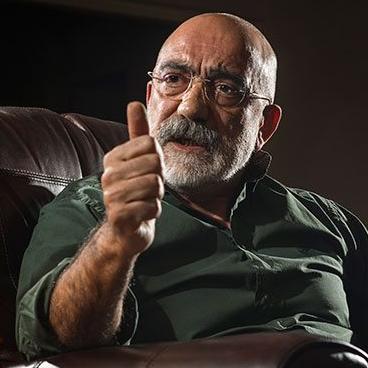Turkey Uncensored is an Index on Censorship project to publish a series of articles from censored Turkish writers, artists and translators.

Jailed Turkish journalist Ahmet Altan.
If made out of the right stuff a journalist is a tough nut. Some of us are, you may say, born that way. Our profession lives in our cells. We are compelled to do what our DNA instructs us to do.
Yet, these days, I can’t help waking up each morning in a state of gloom.
Never before have we, Turkey’s journalists, been subjected to such multi-frontal cruelty. Each and every one of us have at least one — usually more — serious issue to wrestle with. Many have already faced unemployment. According to Turkey’s journalist unions, more than 2,300 media professionals have been forced to down pens since the coup attempt. The silenced face a dark destiny: they will never be rehired by a media under the Erdogan yoke.
More than 120 of my colleagues are in indefinite detention – and that number does not include 19 already sentenced to prison. The latest to be added to the list are the novelist and former editor of daily Taraf, the renowned journalist Ahmet Altan and his brother, Mehmet Altan, a commentator and scholar.
The grim pattern of arrests comes with a note attached: “To be continued…”
Nobel Laureate Orhan Pamuk recently and eloquently summed up what Turkey is becoming: “Everybody, who even just a little, criticises the government is now being locked in jail with a pretext, accompanied by feelings of grudge and intimidation, rather than applying law. There is no more freedom of opinion in Turkey!”
Some of those who are still free, either at home or abroad, may consider themselves lucky – or at least be perceived as such. But the reality is that each and every one of us faces immense hardship.
Being forced into an exile, as I have been, is not an easy existence. Many like me have an arrest warrant hanging over their heads. Others are simply anxious or unwilling to return home.
Pressured by financial strains, a journalist in exile bears the burden of the country they have been torn from while remaining glued to the agony of others.
But there is more. Last week I offered one of my news analyses to a tiny, independent daily — one of the very few remaining in Turkey. Waiving any fee, I asked the editor — who is a tough nut — to consider publishing it. Soon, the text was filed and the initial response was: “This one is great, we will run it.”
Then came a telephone call. Because the editor and I have a friendly relationship, he was open when he told me this: “As we were about to go online with it, one editor suggested we ask our lawyer. I thought he was right in feeling uneasy because everything these days is extraordinary. Then, the lawyer strongly advised against it. Why, we asked. He said that since Mr Baydar has an arrest warrant, publishing a text with his byline or signature would, according to the decrees issued under emergency rule, give the authorities to the right to raid the newspaper, or simply to shut it down. Just like that. Tell Mr Baydar this, I am sure he will understand.”
I did understand. No sane person would want to bear the responsibility for causing the newspaper’s employees to be rendered jobless, to be sent out to starvation.
I have since published piece elsewhere.
This incident is but one in a chain, hidden in Turkey’s relative freedom. It’s a cunning and brutal system of censorship that aims to sever the ties between Turkey’s cursed journalists and their readership. It is a deliberate construction of a wall between us and the public. It is putting us in a cage even if we are breathing freedom elsewhere.
It’s enough to make George Orwell turn in his grave.
But there is some consolation. Thankfully we, the censored among Turkey’s journalists, have space to write about the truth, make comments and offer analysis in spaces like Index on Censorship. Thankfully, we have the internet, which is everybody’s open property, even if the sense of defeat when you awake some mornings leaves you convulsing in the gloom.
You know you have to chase it away and get on with what you know best: to inform, to exchange views, offer independent opinion, promote diversity, and hope that one day it will contribute to democracy.
More Turkey Uncensored
Yavuz Baydar: As academic freedom recedes, intellectuals begin an exodus from Turkey





